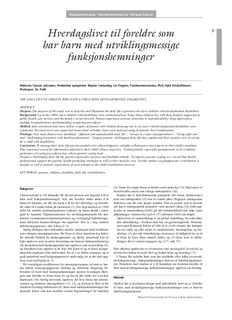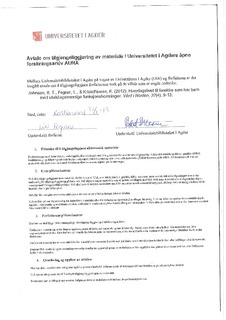| dc.contributor.author | Johnsen, Reidunn Tyssen | |
| dc.contributor.author | Fegran, Liv | |
| dc.contributor.author | Kristoffersen, Kjell | |
| dc.date.accessioned | 2013-01-25T11:38:14Z | |
| dc.date.available | 2013-01-25T11:38:14Z | |
| dc.date.issued | 2012 | |
| dc.identifier.citation | Johnsen, R. T., Fegran, L., & Kristoffersen, K. (2012). Hverdagslivet til foreldre som har barn med utviklingsmessige funksjonshemninger. Vård i Norden, 32(4), 9-13. | no_NO |
| dc.identifier.issn | 0107-4083 | |
| dc.identifier.uri | http://hdl.handle.net/11250/138707 | |
| dc.description | Published version of an article in the journal: Vård i Norden. Also available from the publisher at: http://www.artikel.nu/Bob/GetBob.aspx?bobID=3544 | no_NO |
| dc.description.abstract | Purpose: The purpose of this study was to describe and illuminate the daily life of parents who have children with developmental disabilities.
Background: Up to the 1980’s most children with disabilities were institutionalized. Today these children live with their families supported by public health care services and the family’s social network. Parents experience extreme strain due to unpredictability, sleep deprivation, multiple hospitalizations and demanding caregiving procedures.
Method: Semi structured interviews of four couples of parents with children from age one to six years with developmental disabilities were conducted. The interviews were taped and transcribed verbatim. Data were analyzed using Systematic Text Condensation.
Findings: Four main themes were identified, “different and unpredictable daily life”, “always in a state of preparedness”, “living right now” and “challenging encounters with health professionals“. Despite parents’ challenging daily life they emphasized their positive view of caring for a child with disabilities.
Conclusion: To manage their daily life parents needed to be acknowledged as valuable collaborators and experts on their child’s condition. They expressed a need for information adjusted to their child’s illness trajectory. Training family, especially grandparents, to be confident performers of caring procedures may relieve parents’ caring load. Despite a challenging daily life the parents expressed a positive and healthful attitude. To improve parents’ coping it is crucial that health professionals support the parents’ health promoting strategies as well as their need for care. Further studies on grandparents’ contribution is needed, as well as parents’ experiences of early transfer to the child’s habilitation services. | no_NO |
| dc.language.iso | nob | no_NO |
| dc.publisher | Sykepleiernes Samarbeid i Norden | no_NO |
| dc.subject | parents | no_NO |
| dc.subject | children | no_NO |
| dc.subject | disability | no_NO |
| dc.subject | daily life | no_NO |
| dc.subject | rehabilitation | no_NO |
| dc.title | Hverdagslivet til foreldre som har barn med utviklingsmessige funksjonshemninger | no_NO |
| dc.type | Journal article | no_NO |
| dc.type | Peer reviewed | no_NO |
| dc.subject.nsi | VDP::Medical disciplines: 700::Health sciences: 800::Nursing science: 808 | no_NO |
| dc.source.pagenumber | 9-13 | no_NO |
| dc.source.volume | 32 | no_NO |
| dc.source.journal | Vård i Norden | no_NO |
| dc.source.issue | 4 | no_NO |

